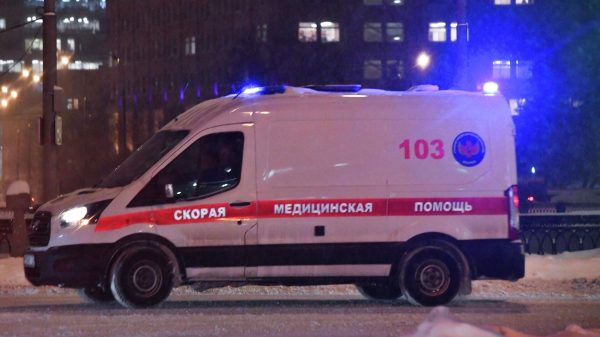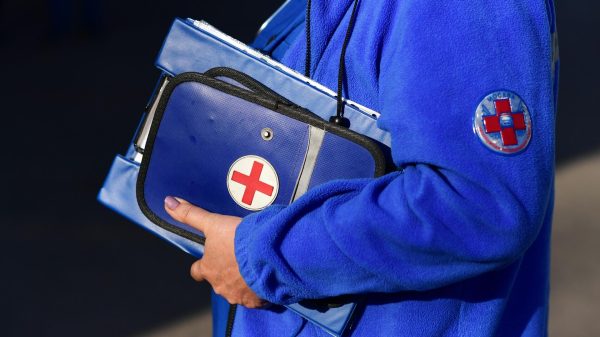
Judith Machaca was last seen on her way home from work in her home town of Tacna in southern Peru. The environmental engineering student had been working part-time at a mobile phone shop and would always send a message if she was going to be late.
The last text message from her phone was sent at 11pm on 28 November and the next day her distraught father reported the 20-year-old’s disappearance to the police. They sent him away, saying that she was probably with a boyfriend and would show up soon enough.
Machaca never came home. When the police continued to do nothing to investigate her disappearance, her family began to protest, holding vigils outside the police station with placards reading “Where is Judith?” and “Police cover-up”.
‘Shadow pandemic’ of violence against women to be tackled with $25m UN fund
Read more
Two months later, mechanical excavators uncovered her body, face down with her wrists bound behind her back, lying next to the body of 14-year-old Noemí Escobar, 80 metres (260ft) down a well on a farm belonging to the parents of a police officer.
Machaca’s killing took an even darker twist when it was revealed that a local judge had released a police officer, Santiago Paco, from custody while he was under investigation for killing both women.
In a series of social media videos posted online from hiding, Paco confessed to the murders and said he was part of a sex-trafficking ring operating from within the very police unit responsible for investigating human trafficking and disappearances.
The police chief for the Tacna region, Gen Segundo Mejía, began an internal police investigation last month. One other officer who worked with Paco has been arrested. About 30 police officers have been moved to other units while the investigation continues.
Paco is still the subject of an extensive manhunt.
By reporting a disappearance, you could be reporting it to the trafficker himself
Katherine Soto, activist
The death of Judith Machaca is just one in a mounting toll of women and girls across the country that has become what human rights activists are calling a deadly emergency in Peru.
The UN has called the surge in violence against women and girls across the world during Covid lockdowns a “shadow pandemic”.
A total of 138 femicides were reported by the authorities in Peru in 2020, but more than 5,521 women were officially recorded as missing on a newly created registry of disappeared people, of whom two-thirds are girls.
Eliana Revollar, who heads the women’s rights division of Peru’s human rights ombudsman’s office, says that the numbers are “very high” but adds: “We don’t have information about how many people are really ‘disappeared’.”

Of last year’s 138 femicides, 34 of the women and girls had previously been reported as disappearances, she says.
But even these official statistics are likely to be a underestimation. According to figures compiled by the Mujeres Desaparecidas (Missing Women), a Facebook-based advocacy group for Peruvian families, 11,828 women and girls were registered as disappeared in 2020 based on police reports. Again, about two-thirds were aged under 18.
Using the same methodology, the organisation has recorded 41,445 disappeared women and girls since the beginning of 2018 until February this year in Peru, a country of nearly 33 million people.
The alleged circumstances around Machaca’s death did not surprise the group’s founder, Katherine Soto, who started the Facebook page in 2016 when an activist friend went missing, before it emerged she had been murdered.
“This case shows that even dealing with the authorities, as a woman, is putting yourself at risk,” she adds. “You don’t know if by reporting a disappearance, you could be reporting it to the trafficker himself.”
No body, no crime
Katherine Soto, activist
Despite the alleged involvement of local officers in the deaths of Machaca and Escobar, widespread police apathy and inaction over the disappearances of women across Peru is facilitating the wave of sexual violence that is gripping the country. Peru has been among the Latin American countries hardest hit by the pandemic, with more than 1.4m Covid cases and nearly 49,000 deaths, and confinement and economic hardship exacerbating risks for women.
A report published jointly by Peru’s justice and women’s ministries this month found that there were more than 23,000 calls and messages to a domestic violence hotline between May and October 2020 – double the number for the same period the previous year.
Violence against women has been a long-established problem in Peru, with about five women and girls reported missing every day on average, according to the ombudsman’s office.
Soto says that with the police often unwilling to investigate, many of the “disappeared” women and girls are never found. “No body, no crime,” she says. “In the case of other disappearances, their families don’t have the right to know the truth, the right to justice, much less the right to have closure.”

Revollar says the disappearances of Peruvian women were not even officially recorded until late in 2020. She was instrumental in setting up a national registry for the missing but it is still incomplete. “It’s moving forward,” she says, “but it’s very slow.”
On Soto’s Facebook page, distraught families and friends post photos and missing person information to seek help from the general public in their search for loved ones. The group also provides legal advice and support for families.
Peru’s current interim government boasts the largest-ever number of women heading key posts and public institutions – from the top judge and speaker of congress to the cabinet chief – but presidential elections next month mean it is unlikely they will have enough time to push through lasting reforms.
The legislation exists to protect women and girls, but without effective enforcement it is just empty words, says Revollar.
“There were only two sentences for femicide in the whole of 2020. Two!” she said. “That is not timely justice.”




















































Свежие комментарии